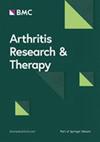Proteoglycan 4 (Lubricin) and regulation of xanthine oxidase in synovial macrophage as a mechanism of controlling synovitis
IF 4.9
2区 医学
Q1 Medicine
引用次数: 0
Abstract
Synovial macrophages (SMs) are important effectors of joint health and disease. A novel Cx3CR1 + TREM2 + SM population expressing the tight junction protein claudin-5, was recently discovered in synovial lining. Ablation of these SMs was associated with onset of arthritis. Proteoglycan 4 (PRG4) is a mucinous glycoprotein that fulfills lubricating and homeostatic roles in the joint. The aim of this work is to study the role of PRG4 in modulating synovitis in the context of SM homeostasis and assess the contribution of xanthine oxidase (XO)-hypoxia inducible factor alpha (HIF-1a) axis to this regulation. We used Prg4FrtloxP/FrtloxP;R26FlpoER/+, a novel transgenic mouse, where the Prg4Frt allele normally expresses the PRG4 protein and was designed to flank the first two exons of Prg4 with a flippase recognition target and “LOXP” sites. Inducing flippase activity with tamoxifen (TAM) inactivates the Frt allele and thus creates a conditional knockout state. We studied anti-inflammatory SMs and XO by quantitative immunohistochemistry, isolated RNA and studied immune pathway activations by multiplexed assays and isolated SMs and studied PRG4 signaling dysfunction in relation to glycolytic switching due to pro-inflammatory activation. Prg4 inactivated mice were treated with oral febuxostat, a specific XO inhibitor, and quantification of Cx3CR1 + TREM2 + SMs, XO immunostaining and synovitis assessment were conducted. Prg4 inactivation induced Cx3CR1 + TREM2 + SM loss (p < 0.001) and upregulated glycolysis and innate immune pathways in the synovium. In isolated SMs, Xdh (p < 0.01) and Hif1a (p < 0.05) were upregulated. Pro-inflammatory activation of SMs was evident by enhanced glycolytic flux and XO-generated reactive oxygen species (ROS). Febuxostat reduced glycolytic flux (p < 0.001) and HIF-1a levels (p < 0.0001) in SMs. Febuxostat also reduced systemic inflammation (p < 0.001), synovial hyperplasia (p < 0.001) and preserved Cx3CR1 + TREM2 + SMs (p < 0.0001) in synovia of Prg4 inactivated mice. PRG4 is a biologically significant modulator of synovial homeostasis via inhibition of XO expression and downstream HIF-1a activation. PRG4 signaling is anti-inflammatory and promotes synovial homeostasis in chronic synovitis, where direct XO inhibition is potentially therapeutic in chronic synovitis.求助全文
约1分钟内获得全文
求助全文
来源期刊

Arthritis Research & Therapy
RHEUMATOLOGY-
CiteScore
8.60
自引率
2.00%
发文量
261
审稿时长
14 weeks
期刊介绍:
Established in 1999, Arthritis Research and Therapy is an international, open access, peer-reviewed journal, publishing original articles in the area of musculoskeletal research and therapy as well as, reviews, commentaries and reports. A major focus of the journal is on the immunologic processes leading to inflammation, damage and repair as they relate to autoimmune rheumatic and musculoskeletal conditions, and which inform the translation of this knowledge into advances in clinical care. Original basic, translational and clinical research is considered for publication along with results of early and late phase therapeutic trials, especially as they pertain to the underpinning science that informs clinical observations in interventional studies.
 求助内容:
求助内容: 应助结果提醒方式:
应助结果提醒方式:


